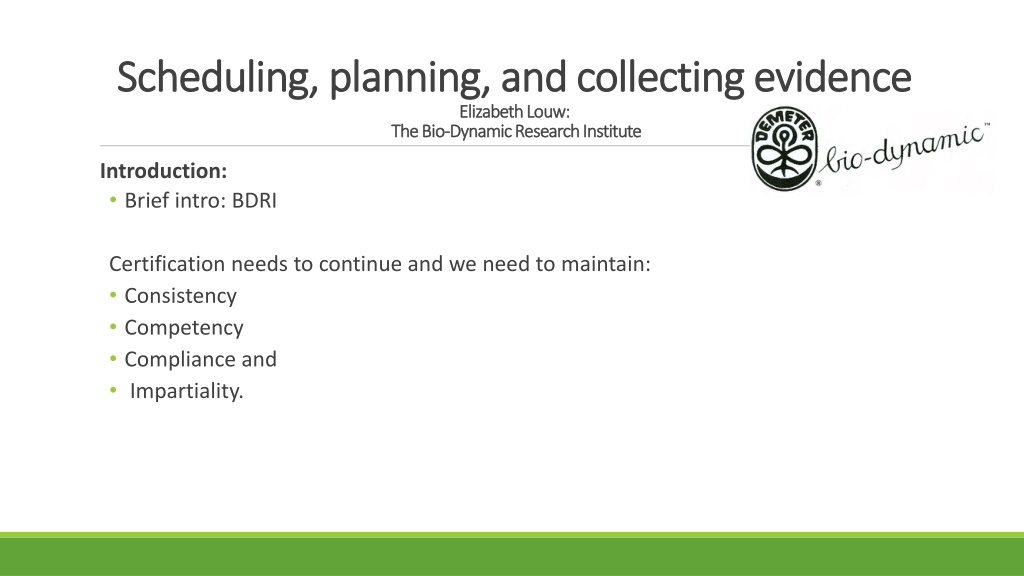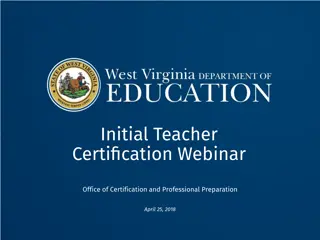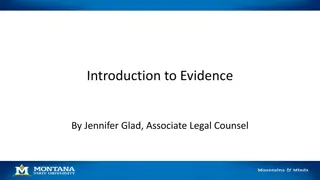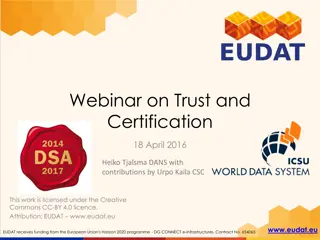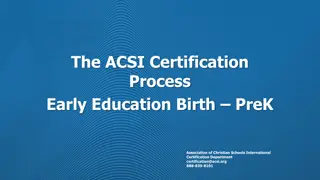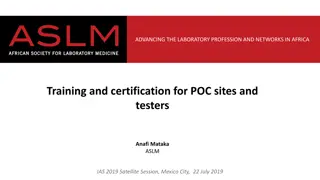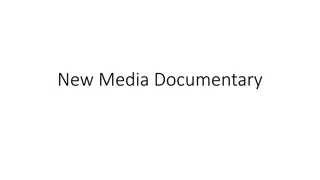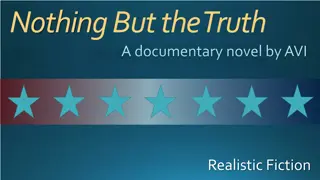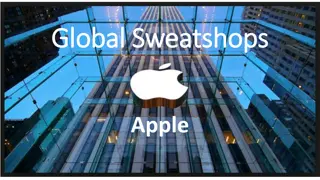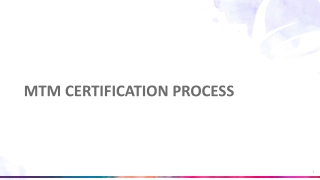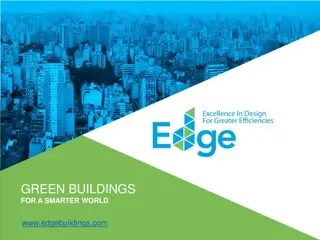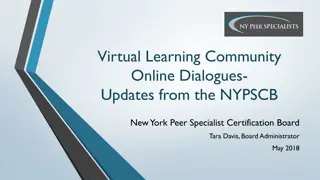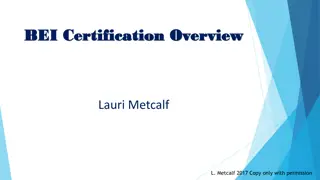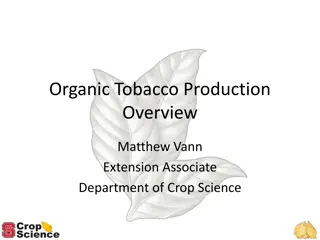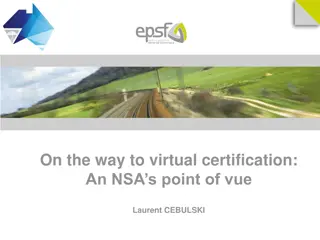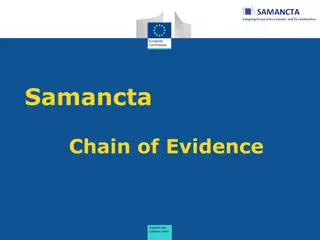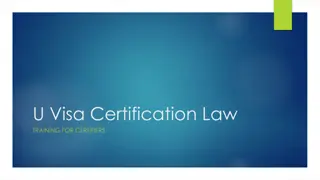Managing Documentary Evidence Challenges in Certification Processes
Addressing the challenges in collecting and reviewing documentary evidence for certification processes, this content discusses the need for adaptability, verification methods, and system development to ensure integrity without compromising compliance. Elizabeth Louw from the Bio-Dynamic Research Institute shares insights on scheduling, planning, and evidence collection within a certification framework, highlighting the importance of consistency, competency, compliance, and impartiality.
- Certification processes
- Evidence collection
- Compliance challenges
- Documentation review
- System development
Download Presentation

Please find below an Image/Link to download the presentation.
The content on the website is provided AS IS for your information and personal use only. It may not be sold, licensed, or shared on other websites without obtaining consent from the author. Download presentation by click this link. If you encounter any issues during the download, it is possible that the publisher has removed the file from their server.
E N D
Presentation Transcript
Scheduling, planning, and collecting evidence Scheduling, planning, and collecting evidence Elizabeth Louw: Elizabeth Louw: The Bio The Bio- -Dynamic Research Institute Dynamic Research Institute Introduction: Brief intro: BDRI Certification needs to continue and we need to maintain: Consistency Competency Compliance and Impartiality.
How to ensure all the usual documentary evidence must still be How to ensure all the usual documentary evidence must still be collected and reviewed collected and reviewed WE will be discussing the above question and this includes the following issues: Issues include: It is not a one size fits all as every client is different. Inspectors must be adaptable. Onsite information is not easily obtained for accurate verification, additional desk audits may also need to be completed. There are additional challenges when product sampling is required as part of certification. I will briefly cover how BDRI approached these and then we will open the floor for discussion
Scheduling, planning, and collecting evidence Scheduling, planning, and collecting evidence Elizabeth Louw: Elizabeth Louw: The Bio The Bio- -Dynamic Research Institute Dynamic Research Institute Challenge: How to develop a system which could quickly adapt to changes without compromising the integrity How? 1. Scheduling: ever changing travel restrictions a state border would be open today and closed next week 2. Planning included (amongst others): Risks were investigated and discussed New systems for data retrieval and storage New inspection reports developed New technology embraced Lots of training. Lots of training. 3. Collecting evidence and verifying
Scheduling, planning, and collecting evidence Scheduling, planning, and collecting evidence Elizabeth Louw: Elizabeth Louw: The Bio The Bio- -Dynamic Research Institute Dynamic Research Institute COLLECTING EVIDENCE: PAPER EVIDENCE FOR VERIFICATION COLLECTING EVIDENCE: HARD PHYSICAL EVIDENCE FOR VERIFICATION soil sampling, Inspection reports invoices/delivery notes. Produce transfer certificates, Sales records, production records, traceability records, inputs, derogations, product/produce sampling Physical Visual inspection of soils etc etc
Scheduling, planning, and collecting evidence Scheduling, planning, and collecting evidence Elizabeth Louw: Elizabeth Louw: The Bio The Bio- -Dynamic Research Institute Dynamic Research Institute Results / Conclusions : Paper easily collected Soil sampling would be an issue Physical Visual inspection would be an issue Product and produce sampling easily collected at end user or processor. EACH Operator will be different and Inspectors would have to be flexible. Each site will have its own challenges:
Scheduling, planning, and collecting evidence Scheduling, planning, and collecting evidence Elizabeth Louw: Elizabeth Louw: The Bio The Bio- -Dynamic Research Institute Dynamic Research Institute BDRI solutions: A combination: 1. Desk audit to Operator PLUS 2. Remote audit by Inspector
Scheduling, planning, and collecting evidence Scheduling, planning, and collecting evidence Elizabeth Louw: Elizabeth Louw: The Bio The Bio- -Dynamic Research Institute Dynamic Research Institute DESK AUDIT Filled in by the Operator Gives an overview of the Operation WHY USEFUL? The answers can be viewed by the inspector BEFORE the remote audit The answers can be compared to the OMP and Maps for verification Inspector can plan which clarifying questions need to be asked for verification. The standard questions are answered and save time when on line.
Scheduling, planning, and collecting evidence Scheduling, planning, and collecting evidence Elizabeth Louw: Elizabeth Louw: The Bio The Bio- -Dynamic Research Institute Dynamic Research Institute REMOTE AUDIT The inspection report consists of the desk audit answers plus the clarifying questions and tables to document evidence. Done by phone/Teams Can ask clarifying questions for verification Opportunity to collect all paper evidence (document request list) An Operator risk assessment is filled in a reviewer could easily decide whether evidence would be required for soil and produce sampling.
Scheduling, planning, and collecting evidence Scheduling, planning, and collecting evidence Elizabeth Louw: Elizabeth Louw: The Bio The Bio- -Dynamic Research Institute Dynamic Research Institute On-site: After Review Additional, high risk and NEW Operators would need a physical on-site visit especially where soil samples are required or a physical visual is required. To consider: Operator safety/inspector safety/Regulations followed Solutions discuss
Scheduling, planning, and collecting evidence Scheduling, planning, and collecting evidence Elizabeth Louw: Elizabeth Louw: The Bio The Bio- -Dynamic Research Institute Dynamic Research Institute How to ensure all the usual documentary evidence must still be collected and reviewed Issues looked at and open for discussion: It is not a one size fits all as every client is different. Inspectors must be adaptable. Onsite information is not easily obtained for accurate verification, additional desk audits may also need to be completed. There are additional challenges when product sampling is required as part of certification.
